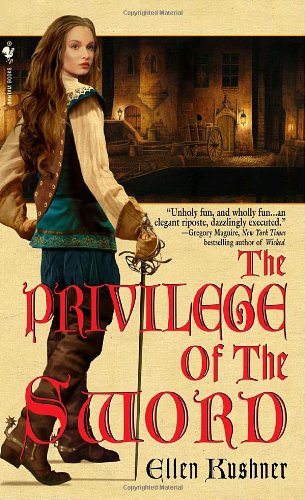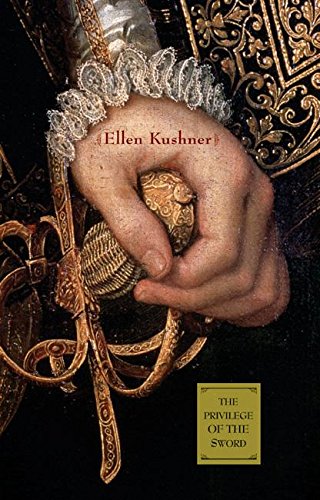
![]() The Privilege of the Sword by Ellen Kushner
The Privilege of the Sword by Ellen Kushner
“Whatever the duke means to do with her, it can’t be anything decent.”
The Privilege of the Sword is Ellen Kushner’s sequel to her novel Swordspoint which was about the doings of the high and low societies in her fictional town of Riverside. The main characters of that novel were the nobleman Alec Tremontaine, a student, and his lover, the famous swordsman Richard St. Vier. You don’t need to read Swordspoint before reading The Privilege of the Sword, but it will probably be more enjoyable if you do because you’ll have some background on most of the characters.
Now Alec is known as the Mad Duke Tremontaine. He spends some of his time in his mansion outside the city, but he really prefers to reside in his house in Riverside where the common people live. The Mad Duke is known for being rapacious and decadent. Yet when he asks his estranged sister to send her 15-year-old daughter Katherine to him, Katherine must go because Alec controls the family fortune.
When Katherine goes to live with her mad uncle, she envisions beautiful new gowns, exciting balls, and gallant suitors. And indeed that’s probably what she would have gotten if this story hadn’t been written by Ellen Kushner. A sweet romantic fantasy isn’t what Kushner had in mind, however (though there is sweetness and romance). Instead, the Mad Duke dresses Katherine like a boy and makes her take swordfighting lessons. She hates this at first, but later she learns that her skills are quite useful for carrying out her romantic schemes. Even later it becomes clear that there’s a method to her uncle’s madness.
Katherine is a delightful character. At the beginning she’s a sweet romantic girl with starry visions and high hopes, but her innocence is challenged when she joins the lascivious duke’s household. She’s forced to grow over the course of the novel and she learns about friendship, honor, and her own (and other people’s) sexuality. Katherine’s friendship with Marcus, a boy who works for the duke, is sweet. However, her friendship with the noblewoman Artemesia, which drives the plot in the second half of the novel, is hard to believe in since two girls hardly know each other. I did like, however, how they were bound together by the romantic admiration for the same book.
 Alec is even more unlikeable in The Privilege of the Sword than he was in Swordspoint, but Kushner provides us with more of his backstory in this novel and he at least becomes a little more sympathetic. By the end I had decided that maybe I liked him after all. He has no respect for the rules of his society and it’s hard not to admire him for that. Readers of Swordspoint will also be interested to see what became of the famous swordsman Richard St. Vier.
Alec is even more unlikeable in The Privilege of the Sword than he was in Swordspoint, but Kushner provides us with more of his backstory in this novel and he at least becomes a little more sympathetic. By the end I had decided that maybe I liked him after all. He has no respect for the rules of his society and it’s hard not to admire him for that. Readers of Swordspoint will also be interested to see what became of the famous swordsman Richard St. Vier.
The plot of The Privilege of the Sword is “lite” and a bit muddled. I found it somewhat dull at first, but it picks up eventually when the political intrigue starts and there’s a mystery for Katherine and Marcus to solve. The story isn’t particularly memorable, but it’s mostly amusing, unpredictable, and mercifully avoids all fantasy clichés. Most notably, it examines gender and sexuality issues in a way that has so far been unusual in fantasy literature. (Though I hesitate to call this novel a fantasy since its only fantastical element is the totally made-up setting.) Most of the characters are exploring their sexuality (which is both homosexual and heterosexual and gets rather decadent in parts) and this, in my opinion, affects the plot negatively. In other words, it could be argued that the book is more about sex than it is about story.
I listened to the audio version of The Privilege of the Sword which was produced by Neil Gaiman Presents and expertly narrated by Ellen Kushner and a full cast. Neil Gaiman and actress Felicia Day make vocal appearances. If you plan to read The Privilege of the Sword, you should consider the audiobook.
~Kat Hooper

![]() My reactions to Ellen Kushner’s The Privilege of the Sword mirror Kat’s almost exactly, and I have some thoughts about why the story unfolds the way it does. Like Kat, I enjoyed Katherine, the young protagonist. I like Katherine’s relationship with her mother and her almost unconscious sense that she, the only girl in her family, is responsible for holding things together, which, as the story opens, she is. Katherine is smart and practical but she is a girl (and of noble family) in her society, so I believed it when, for example, Katherine is horrified the first time she is made to dress in men’s clothing. I liked her naivete and the way she grows throughout the book.
My reactions to Ellen Kushner’s The Privilege of the Sword mirror Kat’s almost exactly, and I have some thoughts about why the story unfolds the way it does. Like Kat, I enjoyed Katherine, the young protagonist. I like Katherine’s relationship with her mother and her almost unconscious sense that she, the only girl in her family, is responsible for holding things together, which, as the story opens, she is. Katherine is smart and practical but she is a girl (and of noble family) in her society, so I believed it when, for example, Katherine is horrified the first time she is made to dress in men’s clothing. I liked her naivete and the way she grows throughout the book.
It seems like the entire first half of the book is stage-setting (I’m using that term deliberately) for a slow-burning plot that kicks into high gear only about fifty pages from the end. A large part of that is Katherine learning sword-fighting and the ways of the city … and the readers being re-introduced to her uncle, Alec Campion, now the Mad Duke. He is just as neurotic as ever, only now he has money and power. I enjoyed Katherine’s growing relationship with Marcus. Like Kat, I found the instant friendship with shallow, sheltered Artimesia implausible. First of all, the two girls barely meet; secondly, Katherine reaches out to Artimesia for help and Artimesia laughs at her. Yet, months later, Katherine is willing to go to great risk to help “her friend.”
The book is episodic, and I think that slows it down and makes some parts even a little boring. The Privilege of the Sword was published before Serial Box began publishing Tremontaine, but I am going to speculate that some sense of a larger, shared fictional world was in the back of Kushner’s mind as she wrote this, which is why we get subplots that introduce completely different characters, and take us so far away from Katherine and The Mad Duke.
And there were things I loved. I enjoy this world and spending time in it. I loved the cheesy novel that the girls bond over, and I love the sense of theater that permeates the book; there is a play made of the book; Marcus and Katherine spy on two lovers from outside the window, and those scenes play out like a pantomime; later they spy on someone in a brothel to the exact same effect. Alec Campion’s behavior is about ninety percent theater, only he knows it. This is a marked contrast to the oblivious nobles who think they live lives of virtue and honesty when ninety percent of what they do is theater as well. It’s no accident that, as Artimesia’s parents are forcing her into a marriage to a rapist, her mother is decking her out like a fashion doll. The Mad Duke is unpopular and considered mad in large part because he calls out the pretense and hypocrisy of the noble lifestyle. The story is filled with themes of disguise, masks, costumes and appearance over truth.
I liked innocent Katherine’s wry sense of humor. In one scene, she walks into her uncle’s chamber where fifteen naked people are sleeping off an orgy. Katherine notes that now she knows that the statues in the sculpture garden are anatomically correct.
I also liked what the story has to say about equality and about sexual violence. Artimesia is sheltered and because of that she does a foolish thing, and faces terrible consequences. When she turns to her family, the people who are supposed to protect her, they ignore her. The whole point of Alec training up his niece to be a “swordsman” comes into focus, because the Mad Duke lives to upend the hypocritical social mores of his society. I loved all of that, and I loved that play. That all said, I found the ending less than believable, and I think it was set up only to allow a graceful exit for two powerful characters. I could hear the plot-structure creaking a bit in the background.
Still, I liked The Privilege of the Sword the way I might like a comfortable chair, even if the upholstery is fraying, or a worn old quilt. It took me back to a place I enjoy and introduced me to some characters I liked. I enjoyed my second visit to Riverside.
~Marion Deeds







I liked Swordspoint, so I think I would enjoy this. Thanks for bringing it to our attention.
I would have to agree. Swordspoint was a fun novel because it actually had a beginning, middle and an end and was full of interesting characters I cared about – it was an actual story. This one bored me because it didn’t seem to have that cohesion.
Marion, you almost make me want to go back and read this again.
Kat, I’ve ordered Tremiointaine Season 1 from Serial Box and I’ll let you know what I think.